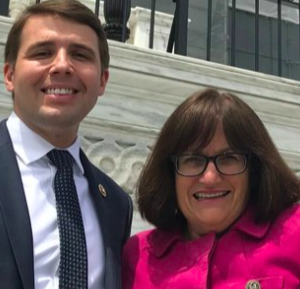In their first legislative votes of the new Congress, New Hampshire’s two House members reconfirmed their support for the massive spending and government expansions Democrats pushed through in the last one.
Both Reps. Annie Kuster and Chris Pappas voted against the Family and Small Business Taxpayer Protection Act, the first piece of legislation brought by the new GOP House majority. The bill, which passed the House on a straight party-line vote, rescinded $72 billion in spending on 87,000 new IRS employees passed by the previous Congress.
The goal of the new IRS spending, according to supporters of the plan, is to collect an additional $200 billion from American taxpayers over the next decade. According to the Congressional Budget Office (CBO), $20 billion of that new money would come from taxpayers who earn less than $400,000 a year. And, the CBO adds, the number of Americans audited will increase in every income bracket, including low and middle-income families. “The rate would rise for all taxpayers,” the CBO reported.
In fact, Syracuse University’s Transactional Records Access Clearinghouse (TRAC) reports that in 2022 “the taxpayer class with unbelievably high audit rates – five and a half times virtually everyone else – were low-income wage-earners taking the earned income tax credit.”’
Setting aside “correspondence audits” — follow-up requests for information or challenges of reporting — and focusing solely on office and field audits, “the odds that millionaires received a regular audit by a revenue agent (1.1 percent) was actually less than the audit rate of the targeted lowest income wage-earners whose audit rate was 1.27 percent,” TRAC reports.
Neither Kuster nor Pappas responded to questions about their vote or their views on the increased audits that will follow. However, Pappas did tweet his opposition to GOP efforts to roll back the spending.
“This would gut enforcement for wealthy tax cheats and large corporations while making it harder for middle-class families to get basic customer service,” Pappas wrote. “And it would add $114 billion to the deficit.”
Only $3.2 billion of the original $80 billion in new spending is earmarked for “basic customer service,” according to the House Ways and Means Committee. However, it’s true that the spending in the so-called Inflation Reduction Act is funded by the $200 billion in additional tax collections.
Former state Senate President Chuck Morse told NHJournal he isn’t surprised by the Democrats’ vote.
“They already supported the massive IRS expansion and increase in audits. This is just par for the course from New Hampshire’s federal delegation,” Morse told NHJournal. “With split control in Washington and tight margins in both chambers, our federal delegation would be smart to do things the New Hampshire Way – balanced budgets, lower taxes, and less intrusion in people’s lives.”
And because New Hampshire has one of the highest percentages of affluent households in the nation, Granite Staters will be audited more often than average, too.
In the past, Kuster and Pappas defended the increased audits — and the billions in new taxes they hope to collect — by saying the Treasury Department would target high earners. But even the Biden administration admitted that wasn’t true. Treasury Secretary Janet Yellen wrote the new IRS funding “shall not be used to increase the share of small business or households below the $400,000 threshold that are audited.” [Emphasis added.]
In other words, there will be many more audits — there have to be to shake another $200 billion out of taxpayers — and there will be more audits of the middle class, but their percentage of this larger total will remain the same.
“Congressmen Pappas and Kuster voted to increase the threat of audits against all New Hampshire taxpayers with a special target on the back of small businessmen and women,” said Grover Norquist of Americans for Tax Reform. “New Hampshire voted recently to phase out the last of their state income taxes (on dividends and interest) and now Kuster and Pappas have invited the IRS into New Hampshire homes and workplaces.”
Sens. Maggie Hassan and Jeanne Shaheen, who also voted for the increased audits and 87,000 new IRS employees last year, are almost certain to oppose the GOP bill when it comes to the Senate.
Media reports claim the 87,000 number is factually incorrect, and The Washington Post gave it “four Pinocchios” — its worst rating. But the same article acknowledges: “On Page 16 of the Treasury report, a chart shows that almost $80 billion in new resources over ten years would allow for the hiring of 86,852 full-time employees in the next decade.” The falsehood, The Post says, is over claiming all 87,000 will be “agents” who conduct audits.
And, The Post acknowledged, the CBO analysis is that there will be a net 50 percent increase in the number of IRS employees thanks to the new spending.
That debate doesn’t change the stated goal of the policy the GOP tried to overturn: Collect $200 billion more from U.S. taxpayers.
New Hampshire Executive Councilor Janet Stevens told NHJournal she “applauds” the Republican legislation “blocking the unconscionable use and waste of taxpayer dollars.”
“A senior Research Fellow at the Grover M. Herman Center calculated that even with a 30-fold audit increase for individuals earning more than $400,000 – coupled with auditing 100 percent of individuals earning $10 million – the projections are 20 percent less than the 2o31 goal of $35.3 billion. The numbers [from the Biden administration] don’t add up.
“Thank you to the GOP leadership for putting an end to this disastrous public policy,” Stevens said.




